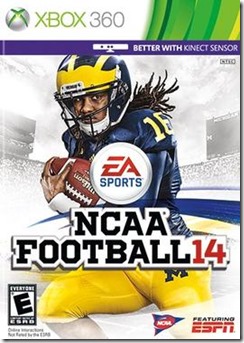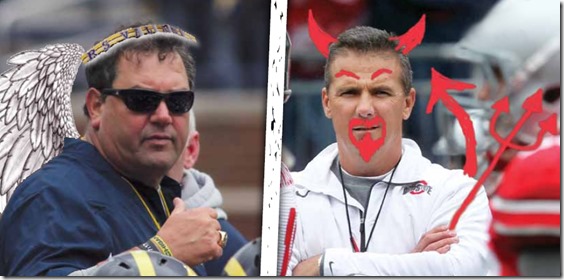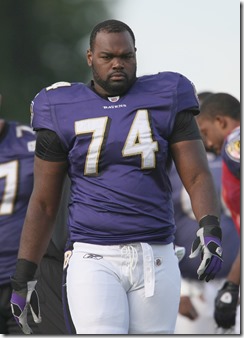Right? (No not really)
I could have asked this when 4th and Long came out, or that time when a recruit gushed about Alabama's honesty and academics, or countless other recent days when the rusty nail of the current competitive atmosphere and my alma mater's place in it took another hammer blow.
"Youngstown Boys" finally inspired this question when I caught myself about to tweet something along the lines of "Ohio State is one of college football's most notorious bad-guys..." (inference that Michigan is a "good guy" meant). And I caught myself, because absent the rivalry and unenforced arbitrary rules by the feckless NCAA, what's so "evil" about a guy hawking a piece of memorabilia he was given for throwing passes over JT Floyd's head?
Course then we all went on vacation, but a few days after the antithesis of college athletics' weird version of morality won the last BCS title to end the long streak of the antithetical conference, so might as well get this out there:
Do you believe it's fair to characterize some programs as "good" or "evil" relative to their peers? What standards do you judge that on? Which schools are top- or bottom-five at this intercollegiate athletic morality stuff? Where's Michigan?
-------------------------------
Brian: This has gotten considerably more difficult as coaching salaries have spiraled out of control and non-revenue sports have gotten ever more palatial palaces for 200-300 people to observe them in. Literally every move in the past 15 years of college football has been an "I'ma get mine" decision from the university presidents on down save some measures from the NCAA like the APR, so it's hard to get on schools that are obviously paying kids like Clemson and Ole Miss like you used to, because subverting an increasingly dishonorable system is not the same thing as the Pony Express was.
 |
| Possible responses: 1. "Don't post this to Twitter". 2. "Lol so little!". 3. "Why are we even pretending?" |
I do still get irritated because this is not 'Nam, there are rules, and vigilante justice is still, like, not legal either. It's frustrating to be a fan of a team that is pretty much on the up-and-up--the NCAA came in with the Rich Rod allegations and came back with penny-ante bullshit--that happens to pretty much suck and watch LaQuon Treadwell do LaQuon Treadwell things. This is the reason all Michigan fans should be selfishly interested in loosening up compensation rules for athletes: Michigan has money, but can't use it to make the revenue sports good. If they could...
Anyway, the true bad guys these days are the ones who take in anyone who can spell their name in three tries and shuffle them through garbage classes they barely have to attend and then spit them out the other end, helpless once their body doesn't make them money. Who are those people? To some extent, everyone, for the same reason seven-foot-tall guys don't shoot free throws that well: they are on the court because of things other than their free throw shooting. A lot of athletes get to college totally unprepared to be at said college, and it is probably better for them to have a shot at fame and a pro career than to toil away at a JUCO anonymously. But some schools are willing to do whatever to keep guys eligible. I don't really know who other than North Carolina, and even that case is more about subverting individual professors who lack oversight than a university-wide conspiracy.
So I've pretty much given up on good and evil with the following exceptions:
[Annoying, probably financially motivated cliffhanger jump goes here]
- Wisconsin basketball, always.
- Ohio State fans are 20% awesome, 40% average, and 40% barely restrained animals, which is about 4x the next-worst college program.
- Oversigning bastards, which is mostly Alabama but also various SEC outfits like Tennessee this year.
- Dick Vitale
- The NBA
- Title IX
None of those thing are controversial save Title IX, so let me explain. Most of the things that are bad can be fixed by simple changes, but whenever you propose these changes everyone's all YOU CAN'T BECAUSE TITLE IX, because Title IX is broken as it applies to the NCAA. It doesn't account for the fact that a number of programs make money and thus are not charity cases. These happen to be the ones with the most problematic ethics things, because they make money. So the easy oversigning fix--everyone can sign 22-25 a year every year, no exceptions--gets shouted down because it potentially increases the number of kids on scholarship on football teams. Because that's a problem. Too many players going to college for free.
As for Michigan, any program that would look at this offensive line and say no thanks JUCOs is probably near the upper tier of academic integritizing and they either aren't paying players or not paying enough. But talking about yourself in these things always has a whiff of...
-------------------------------
Ace: I've given up on the good vs. evil stuff, largely for the same reason as Brian—the greatest evil in all of this is the system designed to generate tons of money for a few (almost exclusively rich) people in power positions based on the work of many (often poor) student-athletes.
Before you shout "BUT SCHOLARSHIPS" you might want to read this CNN investigative piece published yesterday, coincidentally, by Sara Ganim, the reporter who won a Pulitzer for her work on the Jerry Sandusky case. It details the often large gap in academic achievement between the general student population and student-athletes in revenue-generating programs; while much of it focuses on their college entrance exam scores, there's also the huge issue of moving student-athletes through the system even if they're in no way qualified to earn the degree they receive, let alone prepared to make it useful:
Former and current academic advisers, tutors and professors say it's nearly impossible to jump from an elementary to a college reading level while juggling a hectic schedule as an NCAA athlete. They say the NCAA graduation rates are flawed because they don't reflect when a student is being helped too much by academic support.
"They're pushing them through," said Billy Hawkins, an associate professor and athlete mentor at the University of Georgia.
"They're graduating them. UGA is graduating No. 2 in the SEC, so they're able to graduate athletes, but have they learned anything? Are they productive citizens now? That's a thing I worry about. To get a degree is one thing, to be functional with that degree is totally different."
Unless such a player is moving on to the professional ranks, the value of that scholarship is four years of being able to play a sport, enjoy the college experience, and leave with a piece of paper that may or may not hold any real-world value; it's difficult enough right now for college grads with strong academic credentials that translate to their desired field to find a job. That schools—whether it be an institutionalized issue or a matter of rogue professors/tutors—are willing or complicit in being a part of this so they can field a decent football team is far more concerning to me than whether or not Recruit X was able to get a school to pay off his mother's mortgage.
Do I believe Michigan has a higher-than-average "moral standing" among these schools when it comes to giving real academic support, playing by the NCAA's rules, and generally doing their best to have their sports programs reflect the values of the university at large? Yes. I took plenty of classes with athletes—including a couple that were sports-related and taken by a lot of football and basketball players—and never witnessed a student-athlete who was utterly unqualified to attend Michigan; that's not to say there aren't some out there, just that I've never even heard about student-athletes reading at an elementary level, which if you read the CNN piece is a surprisingly (or not, depending on your outlook) huge issue in big-time college athletics.
Also, while Michigan's athletic department is very compliant when it comes to matters of pay-for-play and the like, that doesn't mean some Wolverines aren't receiving benefits on the side that the program doesn't know about; regardless of the diligence of the coaches and compliance staff, there are always going to be boosters and local business owners eager to provide perks to athletes that, whether either party knows it or not, aren't legal by NCAA standards—that kind of stuff is nearly impossible to keep a lid on. I hope this isn't breaking news to anyone.
The posturing about moral high ground is silly to me, since it's done almost entirely by the fans, and quite often those fans have zero idea what actually goes on at their favorite program, let alone anyone else's. Until we collectively give up on the ridiculous ideal of amateurism—an ideal put in place by 19th century upper-class Brits who didn't want to compete on level footing with the working class—and find a solution that fairly compensates student-athletes for the revenue they generate, there will always be widespread cheating in a variety of forms, and I will have a very difficult time getting worked up about it as long as it's of some benefit to the actual athletes; academic fraud, of course, is another matter entirely.
-------------------------------
Mathlete: You guys are no fun. Obviously Ohio St and the entire SEC are evil. Must be Notre Dame and the pro-Catholic media silencing you. Well I won't be silenced.
OK, now that I've got that out of my system, time to go back to my wheelhouse and do some math. I think this is how we want to define evil.
Evil = P(Team willing to bend/break rules for football success)
With that as the general equation, I would define the evil equation as
[Institutional Football Reputation]
Evil = --------------------------------------------------------------------
[Institutional Reputation] - [Institutional Football Reputation]
The more a school's total reputation is tied to the football reputation/success, the more likely they are to enable/ignore the things it takes to get a winning football team. As a whole, the Big Ten has a pretty high academic average and currently a lower overall football reputation than the SEC or OSU, thus the equation works.
Does any of this matter? I don't know. I don't know how I feel about the Ganim article. It's certainly not a surprise, but I don't know that there is a great harm in it either. The players get opportunities they certainly wouldn't have gotten otherwise, the school gets the advantage of their other athletic skills. Now the general exploitation of amateurism by the NCAA, that's an issue independent of academic skill. On a societal level, paying these guys is a non-issue. But if the rules need to change (as I think they do) then they deserve to be applied fairly across the sport. In the end it is just sports. The one issue I have is the revoking of scholarships, forced grey shirts and abuse of medical scholarships. As Brian noted, make strict seasonal signing limits and the problem goes away.
-------------------------------
BiSB: For the most part, I've given up on broad declarations of "good teams" and "evil teams." All schools do some sketchy stuff, but anymore I'm not sure which is worse. Is Michigan State's wrist-slapping spree in the wake of the Rather Hall potluck smackdown worse than Ole Miss's TOTALLY LEGITIMATE recent streak of landing elite talent? Is it worse than Ohio State's hilariously lax enforcement (and possible complicity) of a bunch of minor stuff? Hell if I know. But when I try to establish any objective criteria, Duke basketball ends up on the non-evil side of the ledger, which we all know can't be right.
 |
| According to EA this is the first time Denard Robinson ever appeared in the NCAA football series. |
I agree with most of what has been said, especially about schools that march illiterate guys with blazing 40 times through Underwater Basketweaving or Trigonometry of Pursuit Angles 101 without any attempt to prepare them for life. But for me a lot of the 'good vs. evil' stuff these days is in the context of the increasing gap between the purported ideal of the "student athlete" and the growing reality that these are employees in a for-profit system. So while "evil" may be to strong a word, I have to add the people who are increasing that gap to the naughty list.
When you have an AD, for a completely random example, that increases revenue by a third but by all accounts directs almost none of that increase to student-athletes, that's a problem. When Jim Delany takes on Rutgers and Maryland and claims it is because of anything other than the TV footprint, the whole system looks like a farce.
And when the NCAA makes the argument it makes in the O'Bannon lawsuit, it has me rooting for the 'bad guys' when stuff comes up. These aren't the days where Bo Schembechler makes as much as your average accountant, or when Major League Baseball players had off-season jobs in hardware stores. This is HUGE business, and the longer the Powers That Be insist that the basis of that business should continue to eat cake but not cream cheese, the less I care when people tell that system to shove its head up its own monetization stream.
-------------------------------
Seth: Guys, I went long, and deleted half of it, and it's still long.
I've gone over this stuff in my head a lot—I think every critically thinking college football fan has to, since we cheer with might and main for a thing we all know to varying degrees has a lot that is wrong with it. My answer is a thing I kenned from Tolstoy, paraphrasing:
The constants that determine morality are right, wrong, fact, and man's utter fallibility in determining these things.
I got that from Great Books. I had to take Great Books because I wanted a college liberal arts degree from the University of Michigan, and Michigan won't hand over that kind of degree until you've not only read War & Peace but proven through several mediums that you can grok it. I got "grok" from Heinlein, another Great Books author. I got "kenning" from Stephen King, whom I read while sitting around my frat house, often stoned, failing Great Books.
The path we take through college, and what we get out of it, varies by the individual. The college you go to is supposed to match your utter capacity for learning. I believe it's not so much about learning, but in learning how learn. A degree from a Big Ten university should put you in the 90th percentile of American kenning, and whether or not an employer is impressed by it, critical thinking is THE THING in just about anything you do.
There is undeniable good in athletic scholarships. Marlin Jackson was born with the mental capacity to ken Tolstoy, but came from a place that perverts good intentions and destroys those with them. He rode the vehicle of his athletic ability to the same classrooms, and now uses his mind and fame and money to rescue hundreds of kids from the dangers of places like he came from. Q.E.D.
There is also an undeniable bad in pretending that a lot of athletes are at school to learn to grok anything besides offense and defense. Michigan gets to be snooty about it because in a world where the only thing of value you can give a recruit is your degree, our school with the more valuable degree can effectively pay more than any other with comparable athletics. The reason the SEC, despite sitting on the nation's best talent,* historically couldn't keep up with the northern schools was they couldn't offer anything close to that type of education. The academic gap between Michigan and Alabama is the same as the athletic gap between Alabama and Eastern Michigan. That many athletes Michigan would want can't really ken the things Michigan wants to teach is irrelevant because 18-year-old humans are the worst at recognizing their limitations.
That gap, incidentally, is still well small enough to fit comfortably within that between the letter of NCAA law and the enforcement of it. You probably don't need to be told this, but the body in charge of regulating college athletics is in fact the very worst kind of bureaucracy. They're understaffed, and their investigators are mostly there as a stopover before taking a compliance position at a BCS program. They're also powerless: it's a mostly self-regulatory system, devised for a time when college presidents generally hated their athletic departments and therefore could be trusted to conduct a thorough investigation out of sheer academic pomposity. They do zero proactive regulation, waiting for schools or rival coaches or big news stories to find cases for them, which they invariably screw up unless the school itself retains that old arrogance (*ahem, Michigan). Their definition of a job well done is the appearance of relevance. They are, for nearly all intents and purposes, not.
So no on good and evil, but we can at least agree on the approximation of a consensus morality wherein righteousness isn't about who pays for cream cheese, and evil isn't throwing a sports hero some extra chicken wings in his carry-out order, and that selfishness in demanding a competent league-wide compliance system doesn't undermine the righteousness of it.
I believe I can approximate a factual-like-thing that Michigan's coaches are among the top echelon of programs that follow not just the dodgy regulations but the spirit of collegiate competition, and that part of that comes from the selfish reason and part of it comes from the Tolstoy/Schembechler-ism that facts are facts and right is right, so long as you can recognize it. But can we honestly pretend Dave Brandon's covetous athletic department is absolvable because it follows a set of unenforced, arbitrary rules governing what extra benefits their unpaid labor can receive?
Title IX** is a convenient excuse for a more systemic problem in the NCAA, i.e. that the right thing to do to serve the students they're supposed to serve is often directly contrary to the right thing to do for the rich guys and rich organizations they actually serve.
The players themselves are an underrated part of this whole morality play, since some show up with their hands out and the expectation that they're owed something for their abilities (the recruiting process doesn't help disabuse them of this notion), and others arrive with the dream of saving every poor kid in the Youngstown-Sharon metropolitan suckhole. It's hard, not impossible, for coaches to tell one from the other. I doubt any of us are in a position to do so, at least not until the facts are posted in a twitpic.
I balked when John Bacon suggested the way to fix the NCAA is bar true freshmen from playing and create a functional minor league system for gifted athletes who have no interest in learning Tolstoyian morality or what it is to grok. Those who are in it to play in 100k stadiums and have a degree to fall back on will take that deal; those who are in it as a necessary stopover before the pros would at least lose the pretense. Everybody might benefit from learning how to learn, but I think it's well established that plenty of players value a little bit of pay for their play over a quality education, and that people are willing to provide that pay, and it's not up to us or the NCAA to make that decision for them.
I've come around, because I can't think of a better way, but doubt it will ever happen. These are the same people it took 15 years to convince to have a playoff because their golfing partners might lose incremental revenue, and then it was only because they had a solution that makes more money.
-------------------------------
* (Pat Forde's insistence on the role of demographics is a total red herring; the people who've moved south in the last 20 years aren't producing many football players).
** (As any fan/friend/father of female athletes can attest, Title IX has done a lot of good too. The problem I think is it makes an outdated distinction between boys and girls instead of revenue/non-revenue, and that's not that hard of a fix.)



